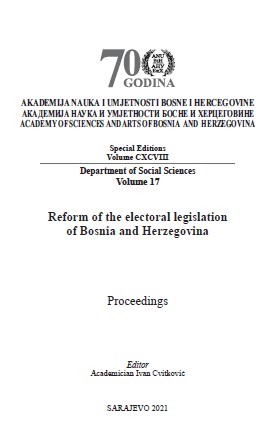Izborni sistem Bosne i Hercegovine: aktuelno stanje i nužne reforme u kontekstu važećih ustavnih rješenja
The Electoral System of Bosnia and Herzegovina: Present Situation and Needed Reforms in the Context of Current Constitutional Solutions
Author(s): Zlatan Begić
Subject(s): Constitutional Law, Human Rights and Humanitarian Law, Government/Political systems, Electoral systems, Politics and law
Published by: Akademija Nauka i Umjetnosti Bosne i Hercegovine
Keywords: BH Constitution; constituency of peoples; equality of citizens; democratic standards; suffrage/voting rights; reform;
Summary/Abstract: The electoral system of Bosnia and Herzegovina (hereinafter: BH) is based on the constitutional and legal solutions which, in their original form, as is well known, do not enable the consistent realization of generally accepted international democratic standards regarding the equality of citizens’ suffrage/voting rights. The European Court of Human Rights in Strasbourg has already taken a position on this in certain individual cases. The constant violation and ignoring of the obligations related to the harmonization of the internal legal order of BH with international democratic standards and judgments of the European Court of Human Rights - which are obligations of a constitutional and legal nature - has led not only to further violation of citizens’ voting rights, but also to further development of undemocratic political concepts that seek to introduce new forms of discrimination in the phase of elections. The terms and notions are interpreted and explained in a hitherto unknown and fundamentally wrong way in the theory and practice of constitutional and public law - such as “legitimate representation of constituent peoples”, “authentic representatives of constituent peoples”, which is followed by the efforts to “nationalize” constituent peoples etc. and with the intention of any theoretical grounding of these inconsistent political views. Besides, in the conditions of undemocratic constitutional solutions and taking into account the real power of decision-making within institutions, the election winner is not crucially determined by the citizens in the elections - as shown by the last general elections in 2018. Among the other things, the absolute election winner regarding possibility of establishment of government and blocking the implementation of election results was promoted by the decision/Instruction of the BH Central Election Commission related to the distribution of delegate seats in the House of Peoples of the Federation of BH, and thus (almost in advance!) determined by inconsistent constitutional/legal solutions and electoral geometry. This further disqualifies the position of the citizens and violate the generally accepted international democratic standards without which a democratic society cannot exist and develop. All of this seriously violate the democratic legitimacy and capacity of the institutions as well as the principle of rule of law and fulfillment of legal and political obligations on the path of European integrations. In contrast, BH’s legal obligations towards electoral reform, no matter how many different modalities they may have, are quite clear and imply, in the first place, equality of active and passive voting rights of citizens regardless of ethnicity or any other circumstance, which is subject of consideration on this occasion.
Book: Reforma izbornog zakonodavstva Bosne i Hercegovine
- Page Range: 80-111
- Page Count: 32
- Publication Year: 2021
- Language: Bosnian, Croatian, Serbian
- Content File-PDF

